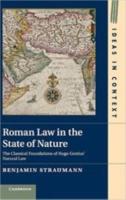
CUP (2015) 269pp £65 (ISBN 9781107092907)
This book is an account of the life and works of Hugo Grotius (1583-1645), a Dutch scholar and jurist who developed theories of natural law and international law. Grotius’ theories may be summarised as follows:
(i) Man is driven by social instinct, and natural law (ius naturale) comprises a set of rules and rights which can be inferred from human nature. Examples are the rights to defend oneself, to acquire property and to punish. The high seas are an existing state of nature and cannot be owned. Therefore Portugal’s assertion of dominion over the seas of South East Asia is unlawful, and Dutch reprisals against Portuguese shipping are lawful. (ii) International law (ius gentium) can be gleaned partly from human nature and partly from the consensus of the wisest nations, pre-eminently the Greeks and the Romans. The private law rules which govern individuals also apply to states. In this book S. traces the development of Grotius’ thought from his early work De iure praedae (1606) to his major work De iure belli ac pacis (first edition 1625). Grotius draws on Greek literature and philosophy, in particular Aristotle’s theory of justice in the Nichomachean Ethics. S. argues, however, that Roman literature and law exert by far the strongest influence on Grotius’ work, in particular, Cicero and the jurists.
In developing his theory of natural law, Grotius cites Cicero’s Pro Balbo, De republica, De legibus, De finibus and De officiis. S. demonstrates how closely Grotius follows Cicero’s method of argument. In particular Grotius, like Cicero, deploys the Greek sceptic Carneades to put forward contrary views, which are duly demolished.
Turning to international law, S. shows that Grotius has developed the Roman concept of ‘just war’. Grotius treats the principles of Roman private law as applicable to the conduct of states. He cites the lex Aquilia and Justinian’s Digest for this purpose. Grotius adopts Cicero’s defence of Roman imperialism in order to justify Dutch expansion in the Far East. However, by sleight of hand, Grotius modifies Cicero’s principles so that they accord with Dutch policy (pages 142-146). S. also exposes Grotius’ debt to Quintilian: Grotius uses deductio to ascertain natural law, but inductio to identify international law. Grotius also copies Quintilian’s method of argument, citing both Greek and Roman authors as testimonia in support of his case. Indeed, this is a vital stage in demonstrating what is the consensus amongst the wisest and best nations. S.’s book is not for the general reader. It assumes familiarity with Thucydides, the Stoics, Aristotle, Livy and Justinian. But for any reader who has the background knowledge, S.’s book is a rewarding, indeed fascinating, account of the intellectual development of one of the world’s great jurists. En passant, S. demonstrates that both Grotius and Cicero were patriots; their ‘universal’ theories were shaped by the political context in which they were writing.
Rupert Jackson—Court of Appeal
